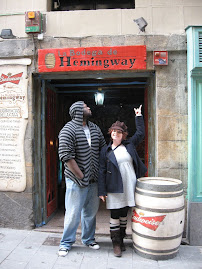Donna touched upon this in her comment to my earlier blog, but I think Caplan's examination is pretty interesting from an autism-mom's perspective. I have never had the "you shouldn't have gotten your son vaccinated" line thrown at me, but it's pretty common among some autism circles. In fact, while Caplan notes that scientific research has "put the nail in the coffin" on the connections between autism and vaccinations, I would venture that if he were to lurk long at many autism blogs written by parents, he would see that this connection is *much* more common and disputed than he might like to think. It actually gets down right ugly. Vicious.
I think, like Donna noted, that the mistrust of the government is partially to blame. Something I find a little interesting, if I can go on for a second off topic. The American people seemed to have put 100% faith in a president who had no verifiable truth that WMD existed in Iraq, but when we have 100% no verifiable truth that autism is connected to vaccines--then people begin to mistrust the government?
There is also the fear of the "intelligencia" that I think is going on, also. Of course, this is just an observation of mine, but many of the autism advocates that I've met online who hold degrees higher than the BA level do not adhere to this "vaccine" theory of causation in regard to autism. It's not that I think those with more education are more likely to read the literature than those without, but I have to wonder whether those of us who are more "on the inside" of government bureaucracy are more likely to know the chains of command, so to speak. We're more likely to believe that credible research is going on at research universities and institutions and at the CDC; such that, we don't tend to fall into the "I don't trust the scientists who work for the government." Because as of late, much of the criticisms I read regarding the CDC and the research into autism and vaccinations isn't that the research doesn't exist to disprove the links. Many of the vaccine and autism advocates acknowledge that the research exists. But, that the research is tainted, faulty, or part of a larger government conspiracy.
So, how might this come back to rhetoric? Well, first, I think this goes to show more of the rhetoric of autism as a "white, affluent, Western" condition. Many academia people have autistic children, read autistic literature, and fight the good fight for neuro-diversity (as it's called in my circles). And, I could go on here for a while... for a later post, I suppose.
But, the seemingly popularity of the autism-vaccination causation theory stems, I believe, partly in the dissemination of the autism literature. Specifically, many of the opponents of vaccine theories are within academia and the government. The discourses are one, already suspect, and two, probably not written for a wide enough audience. As a discourse, it's too specific to a smaller discourse community. However, some of the more widely distributed materials regarding autism come from the Autism Society of America, Autism Speaks (or as it's called in neuro-diversity circles, Autism Weeps--it's the organization responsible for the "Autism Everyday" video in which a mother discusses killing herself and her autistic child), and Cure Autism Now (this is the organization responsible for those corny "puzzle" car magnets).
These national organizations, honestly, do a much better job of getting their agendas across. They've held countless charity events with celebrity sponsors (Jon Stewart and Stephen Colbert to name two) and are accessible to parents of autistic children. Type in "autism" in google and the first listing, I will bet you a dollar, is from either of the three organizations I listed above.
Interestingly, I just picked up a book for a general audience (I was getting it for my ex-husband who is having a difficult time adjusting to the diagnosis still) regarding autism spectrum disorders, and the author is on the board of directors for the Autism Society of America. In the book, she lists the various theories as to the causes of autism, from environmental heavy metals to vaccines to brain abnormality. She also lists many of the biological and chemical treatments available to parents (chelation, vitamin B injections, gluten and dairy-free diets, just to name a few) encouraging parents to try those that they believe might help their children. Because, of course, it couldn't hurt, right?
What's funny is that in her discussion on behavioral treatments, such as behavior modification therapy (practice desired behaviors and reward, ignore negative) and sunrise therapy (shadowing the autistic child, repeating whatever they do as if a mirrored reflection), she cautions parents to use their discretion that these techniques haven't been proven effective for large populations of autistic children.
This is a general book on autism. One that looks like any other. But, it's based on biomedical causations and treatments. Sponsored by the Autism Society of America. Had I known this author worked for them, I would have never ordered the book. Like I said, the vaccines cause autism people have much better resources and have been able to reach the general audience much more effectively.
Still, I think the tides are changing and this is where I think my dissertation comes in. Specifically, the use of blogs (not just blogs like this but professional blogs or web communities) to create a grassroots effort to encourage neuro-diversity. It's actually called PosAutive and there are videos, sort of like PSA's available on youtube. Parents attempting, without the money or resources, to counter the big spenders of the national organizations. This is the rhetoric of autism that I find amazing. The civic discourse that is challenging those typically who spoke the loudest. God bless the Internet.
Saturday, March 10, 2007
Subscribe to:
Post Comments (Atom)








6 comments:
You know, the more I think about it, the more important I find the canon of delivery in these discussions of media...
hmmm...
I had a student last semester whose mother is a therapist (if I recall correctly she's in physical therapy, but I wouldn't put all my eggs in that basket). She works a lot with autistic children and will swear by the fact that it is the vaccines that gave these children autism. She's so behind this theory that her daughter wrote her argumentative paper on stopping the vaccines.
Oh, and on another slightly off-topic note. My students are talking about Ashley X in class right now. I'm amazed at the argument they're having about whether the parents should or should not have been allowed to alter their child's body as they have. It's interesting to me how everybody has an opinion on these issues even if they have never encountered the situation on a personal level.
Delivery is EXACTLY the canon that I always find myself drawn too -- that's exactly why I was so flumoxed by the Caplan article, I think. It seems that no matter what "side" of these autism debates you find yourself - delivery from the authority or alleged "expert" makes all the difference in the world. Ethos and Logos are out the window... all that matters is the reaction you ignite in your audience (Cicero vindicated?).
Rochelle, I think you make a good point too (like you ever DON'T??) about the role of government. In fact, in my own life, I've found that the same people who blithly believe any neo-con rhetoric that emerges are also the same crowd who are suspicious that our government has "lied" about vaccines for some unknown reason.
This all comes down to delivery in my book --- it plays on what you yourself refer to as the rheoric (or maybe it's a SIXTH canon???) of FEAR. Ignorance always leads to irrational fear. I fall prey to thsi myself sometimes, in fact; but this particular faction of society is often intentionally manipulated and USED by certain power groups. Fear is, after all, the great motivator - and it rarely provides the time these people would need in order to reflect on the irrationality or illogical contradictions of their political or social belief system in question.
I think the rhetorical implications of ignorance and fear are at the heart of your rhetorical analysis - so far...
Hi, Katt--
Yea, the vaccines debate gets pretty heated. Go to autismvox.com and read some of the comments on "Autism: It's not toxic" just to get a glimpse of the fervor. I find the whole vaccines debate, hogwash, personally. I think there needs to be "someone" or "something" to place blame on. And, I really believe that in 10-15 years, the whole point will be moot. It's one of those debates that doctors and scientists don't subscribe to, although some parents of autistic children and some members of the general public do.
Donna--in regard to fear, is there anymore fearful than something so misunderstood than autism? Something that "attacks" the most vulnerable--children.
Of course, this negates the existence of autistic adults in society. Who are there.
Post a Comment